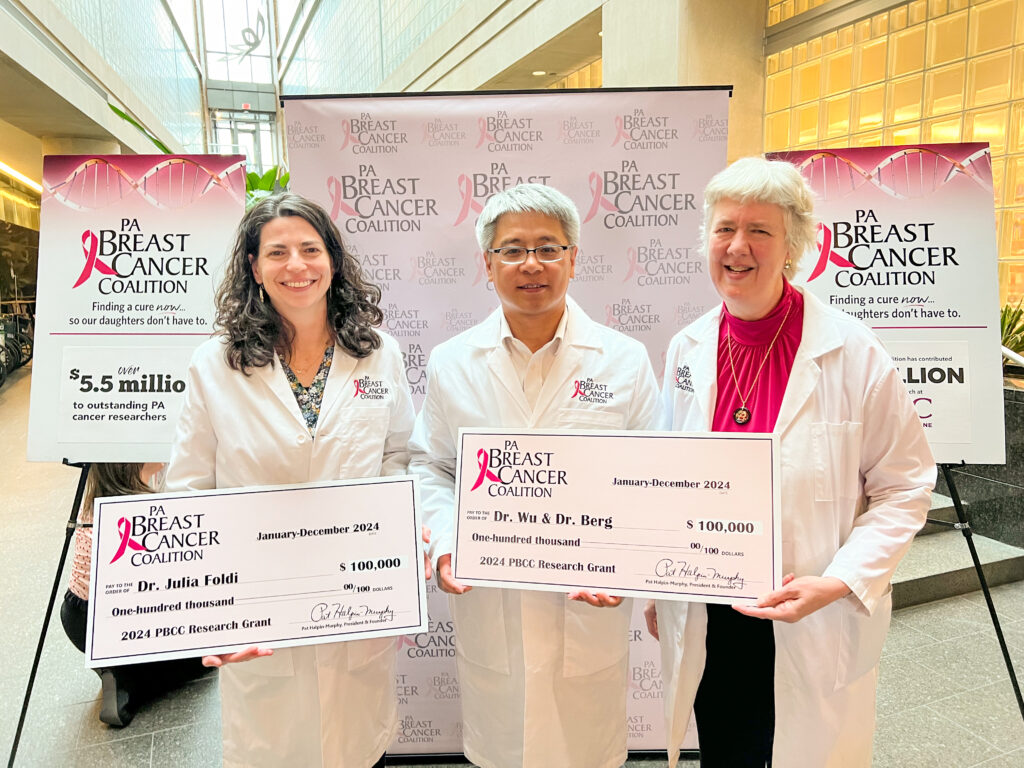 The PA Breast Cancer Coalition recently awarded two $100,000 research grants to researchers at the University of Pittsburgh and UPMC Hillman Cancer Center. Julia Foldi, M.D., Ph.D., a medical oncologist at UPMC Hillman and Assistant Professor of Medicine at Pitt, Shandong Wu, Ph.D., Associate Professor of Radiology at Pitt and Wendie Berg, M.D., Ph.D., F.A.C.R., Distinguished Professor of Radiology at Magee-Womens Hospital, were presented with $100,000 grants on Wednesday, March 19 during an event at UPMC Hillman Cancer Center. To date, the PA Breast Cancer Coalition has contributed $1.5 million to UPMC cancer research.
The PA Breast Cancer Coalition recently awarded two $100,000 research grants to researchers at the University of Pittsburgh and UPMC Hillman Cancer Center. Julia Foldi, M.D., Ph.D., a medical oncologist at UPMC Hillman and Assistant Professor of Medicine at Pitt, Shandong Wu, Ph.D., Associate Professor of Radiology at Pitt and Wendie Berg, M.D., Ph.D., F.A.C.R., Distinguished Professor of Radiology at Magee-Womens Hospital, were presented with $100,000 grants on Wednesday, March 19 during an event at UPMC Hillman Cancer Center. To date, the PA Breast Cancer Coalition has contributed $1.5 million to UPMC cancer research.
Dr. Foldi studies behaviors of invasive lobular breast cancer (ILC), the second most common type of breast cancer. ILC has a higher rate of recurrence after 5 years than invasive ductal breast cancer (IDC), another common type. Her team will use PBCC funding to focus on determining why patients with ILC have a greater risk of late metastasis in the hopes of developing targeted therapies and possible recurrence prevention measures in the future.
“Without people like you who donate to research, specifically to breast cancer research, we would not be able to do the things we do. We would not be able to move the field forward,” said Foldi. “The only way we can improve the lives of those who are affected with this disease is through research… these grants really do make a huge difference in terms of getting our research started. “
Dr. Wu’s PBCC-funded research focuses on breast cancer screening techniques. In conjunction with previous PBCC research grant winner and co-principal investigator Dr. Wendie Berg, Dr. Wu studies contrast-enhanced mammography (CEM). This is a more effective modality than traditional mammography and includes injecting contrast or dye through an IV into the patient to view clearer images of the breast tissue. CEM is preferred by many patients over breast MRI; however, it produces a higher number of false positives.
“They key is to understand what actually causes the false positives so we can try to address it. Unfortunately, clinically, it is very hard to quantify and assess these images,” Wu said. “So in this project, we propose to use artificial intelligence, computational modeling and machine learning to reduce false positives in contrast enhanced mammography.”
Dr. Wendie Berg is a 6-time PBCC research grant recipient for her work studying breast cancer screening modalities.
We actually first got funding from the PA Breast Cancer Coalition for a study of screening with contrast-enhanced mammography in 2021. We completed that study in March of last year and we found that it was very good at finding small cancers.,” said Berg. “But one of the interesting things that we found is that, especially in women who are younger or premenopausal or even especially perimenopausal women, there was a lot of background enhancement. So, if we can use computer interpretation to recognize the normal things from not normal findings, that would be extremely helpful, especially in that patient population.”
Dr. Wu and Dr. Berg’s team will utilize artificial intelligence to create new software aimed at distinguishing normal findings from abnormalities in CEM screenings.
The PA Breast Cancer Coalition has awarded more than $5.5 million to outstanding cancer researchers through its Research Grants Initiative. Funding for PBCC grants is made possible by Pennsylvanians who choose to contribute through online driver’s license renewals, vehicle registration renewals or state income tax refunds. To learn more, visit opens in a new windowpbcc.me/research.
